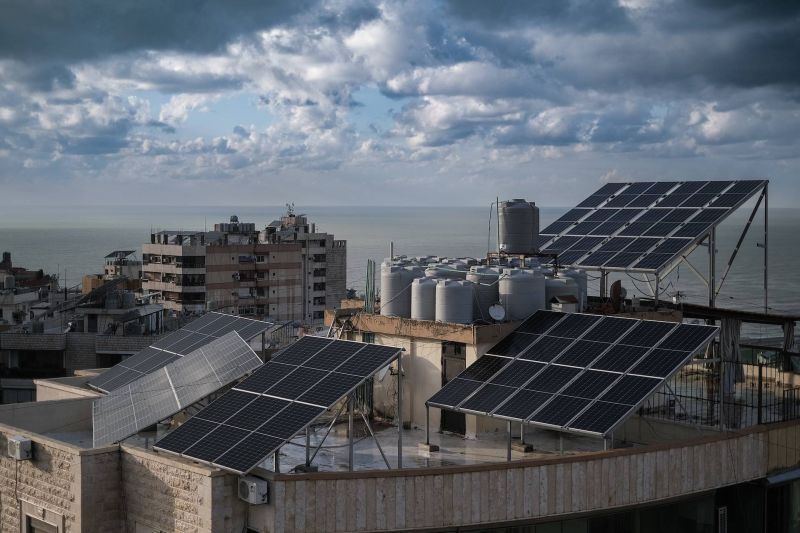
Solar panels installed on roofs overlooking Beirut International Airport, south of Beirut, Jan. 14, 2024. Credit: João Sousa/L'Orient Today)
BEIRUT — The World Energy Council still does not categorize Lebanon as a “very poor performer” despite only half of the public power plants running, and a hastily established solar panel grid plus a web of privately owned generators filling in the gaps.
The association, founded in 1923 and boasting nearly 3,000 organizations and members across 100 countries, ranked Lebanon 68th out of 126 countries worldwide in its latest 2024 Energy Trilemma Index.
The index was published on the sidelines of the 26th WEC Congress in Rotterdam, to which a Lebanese delegation led by Walid Fayad, the outgoing Minister of Energy and Water, was invited, accompanied by some fifteen players involved in Lebanon's energy sector.
According to WEC, the index does not evaluate the state of the country's energy sector, but rather the quality of its regulations, and more specifically its ability to enable the development of "safe, affordable and environmentally friendly" energy.
The ranking is calculated with attention to safety, capital, and environment — three categories which are graded from A to D — and also takes into consideration a country's macroeconomic and institutional situation.
Lebanon obtained a score of 57.7 points out of 100 with a DACd ("D" for the "security" aspect, "A" for the "capital" aspect, "C" for the "respect for the environment" and "d" for the economic situation).
Lebanon's score was below the world average (62.8 points), but slightly higher than its previous score (57 points).
At the regional level, the country was ranked 12th out of 14. Jordan was just ahead (58.3 points) and the highest-ranked Arab country, the United Arab Emirates, came in at 70.3 points.
In its report, the WEC praised the progress made by Lebanon following the adoption in December 2023 by Parliament of the draft law on decentralized electricity production from renewable energies.
The law established a legal framework authorizing the private sector and municipalities to generate electricity and distribute it via the Electricité du Liban (EDL) grid.
According to Elias Khoury, a member of the Lebanese delegation that went to Rotterdam for the WEC Congress, the Lebanese market has also made great strides in filtering the quality of equipment imported to deploy solar panel systems, after the period of relative chaos that followed the onset of the crisis.
"The sector has learned from its mistakes and players have understood the danger of seeking to maximize margins at all costs, to the detriment of quality. Customers are also more demanding," he told L’Orient-Le Jour.
Between 2019 and 2022, the country experienced a period of intense public and private electricity rationing, prompting many Lebanese who could afford it to equip themselves with solar panels or batteries.
In June 2023, according to the Lebanese Center for Energy Conservation, Lebanon passed the 1,000 megawatt-peak (MWp) mark in installed solar panel capacity (excluding solar water heaters). The year 2022 was particularly big for solar energy, with 663 MW installed.
This article originally appeared in French on L'Orient-Le Jour. Translated by Amelia Hankins.